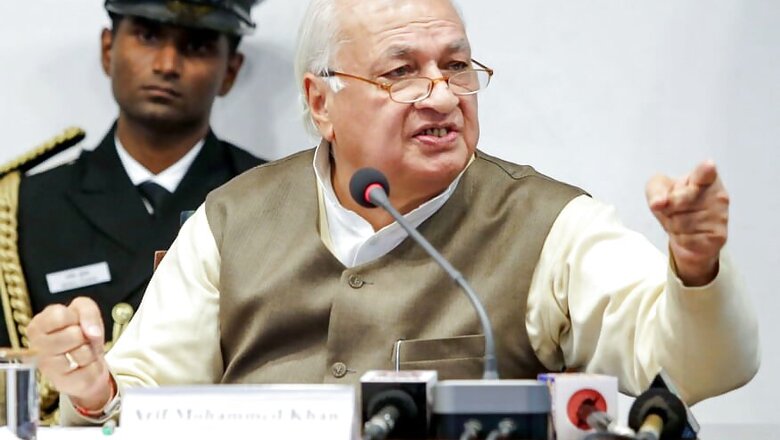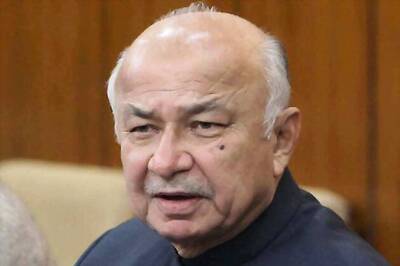
views
New Delhi: Mahatma Gandhi was one of the proponents of the idea of giving shelter to non-Muslims facing persecution in Pakistan. The thought was strongly advocated by other leaders like Pandit Jawaharlal Nehru, Dr Rajendra Prasad and Maulana Azad.
Speaking on the issue of granting citizenship to persecuted minorities, Kerala Governor Arif Mohammad Khan said, “Today, it is being seen as communal, but there has always been a national consensus on the issue with (senior Congress leaders) Manmohan Singh, Ashok Gehlot and Pranab Mukherjee voicing their commitment to the cause.”
As far as the National Register of Citizens (NRC) is concerned, he said it was the Congress’ brainchild and there is no country without a register of its citizens. Khan was speaking at the Nehru Museum Memorial and Library on the topic of “Citizenship institutional and civilizational.”
Partition
Khan started his speech with the baggage of Partition and said the circumstances of minorities in neighbouring countries have compelled India to take a call on granting them citizenship. “India was partitioned in the name of religion. We are still carrying the baggage of Partition, and no one can claim otherwise.”
On the contentious Citizenship (Amendment) Act, 2019, he said, “On August 11, 1947, (Muhammad Ali) Jinnah said in the Constituent Assembly that from now, Hindus would cease to be Hindus, Muslims would cease to be Muslims in Pakistan. This was not said in a religious sense, but it meant that all Pakistanis would be having equal rights.”
Khan said that for 10 years from 1937-47, Jinnah continued to stick to how distinct were Hindus and Muslims and that they cannot live together. “For 10 years, he consistently maintained that one line — Hindus and Muslims are like chalk and cheese, cannot live together. After his movement succeeded, he realised unity is needed. To run the movement, people were separated on religious lines, but one cannot run a country by promoting separatism,” Khan said.
He added that had Jinnah not died within a year, and pursued this line of equality, he might have been killed. “I don’t think the thought process he created for 10 years would have tolerated this stance (of equality). He would have been killed. The mindset he had created, cannot change so quickly.”
Promise Made
At the time of Partition, there was mass migration on religious lines. Khan said, “Most of the Hindus migrated and then a promise was made to the non-Muslims of Pakistan. Maulana Azad had said that Hindus can’t stay in Pakistan and that Western Pakistan is militant. Hindus will flee or will be made to run (away).”
“A month before Partition, nobody accused Gandhi of being communal. He too had said that Hindus and Sikhs who do not want to live there, without doubt they have the right to come to India. It was recognised as their right, not a favour.”
Quoting Gandhi, Khan said, “In this matter, the Government of India is bound to provide them citizenship, employment and facilities to live a comfortable life.”
Recalling Nehru’s concern for minorities in Pakistan, Khan said, “Nehru was concerned about brothers and sisters who are alienated due to new political boundaries, and are not able to participate in freedom celebrations. He said, ‘I want to make it clear they belong to us, and shall belong to us. Their welfare is uppermost on our minds. I want to assure them, Hindus and Sikhs of Pakistan they are free to come here. Whenever they choose to come to India, we shall accept them.’”
Even Dr Rajender Prasad had told the minorities of Pakistan that they had the freedom to come to India.
Khan said the All India Congress Committee Resolution passed on November 25, 1947, had said, “The Congress is duty-bound to provide complete security to non-Muslims of Pakistan, who have crossed the boundary or will cross to protect their lives and honour. We will accept these people who flee from Pakistan.”
Khan said this distinction was made not because “the Congress was communal. But because minorities were persecuted. This situation is not indigenous, and this situation has been imposed on us.”
He narrated the incident of Law Minister of Pakistan Jogindernath Mandal. “In the darkness of night, a sitting minister runs to another country, and resigns after reaching India. Read that letter, to see what Pakistan started doing to its minorities. People say this is an old story, but only three years ago, a member of a Provincial Assembly migrated with his family illegally into India… such stories continue."
Talking about the Congress leadership of recent times, Khan said in 2003, Manmohan Singh had said that it was the government’s moral duty to provide citizenship to those facing persecution in Bangladesh.
Even former president Pranab Mukerjee had said in 2007 that he had conveyed to the Bangladesh government that persecution of minorities will have an adverse impact on public sentiment in India, which in turn will affect liberal tides.
Ashok Gehlot, who is now the Chief Minister of Rajasthan, had also conveyed a similar opinion to (the then Union minister) P Chidambaram on this issue.
NRC and Congress
“Who introduced NRC? In 1985, the (Assam) Accord was signed with the (Asom Gana Parishad) AGP leaders. Who had then extended it to the national level? In 2003, Clause 14 was added, and NRC which was to be prepared for Assam was extended to the national level. Who did it? In 2009, Chidamabram saw that the law was not strong enough and hence, Rule 4 was added to strengthen it. Who is responsible?”
Having said that, there is no country in the world which does not have a register of its citizens, Khan added.
Regarding the nationwide protests over the issue, the governor said, “A picture has been painted as if other than those listed, nobody would be given citizenship. The move will deal with the particular subject, with those who have been made to flee because of their religion. Every case will be decided on merit, but these people (persecuted minorities) as a class, a commitment was made to them in 1947 and it is understandable… because they were victims of a demand which they had not made. Victims of a system which was created much against the assurances given to these people.”

















Comments
0 comment